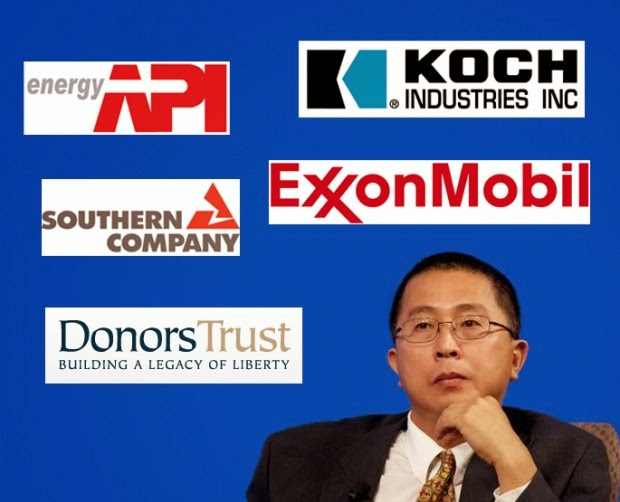Willie Soon, scientist at the Harvard-Smithsonian took over $1 million from fossil fuel companies to finance his studies and he failed to disclose his conflict of interest in the papers he published, where he denied the human role on climate change.
A few years ago, someone discovered that I owned shares in a company working on new technologies in wind power. That generated an attack against me on the part of some supporters of cold fusion.
The attack was based on a sort of an Aristotelic syllogism that went like this: thesis: Ugo Bardi has criticized cold fusion; antithesis: Ugo Bardi has invested in wind power; synthesis: Ugo Bardi criticizes cold fusion only because he wants the money he can make with wind power. Yes, the level of the debate can get this low! (*)
Of course, these accusations were totally absurd, but, for a while, the attack gained some traction on the web and it generated a wave of insults and smears against me (some details are here - in Italian). This initial success was based on the claim that I had been hiding something dark and shameful that could be unveiled only after a difficult investigation. Unfortunately for those who had started the attack, my involvement with that company was no secret and discovering it needed no investigation. I had publicly stated it at least three years before! I just had to point out my previous disclosure to see the whole brouhaha deflating and dying out.
This story shows how important it is to disclose all of one's potential conflicts of interest, no matter how unlikely and remote they may be. Of course, given the present level of the debate, whatever you do, you'll be always misunderstood, but, if you do it openly, you are much less vulnerable. It is a lesson that was lost on Dr. Willie Soon. In the scandal known as the "Willie Soon-gate," he failed to disclose that his scientific papers in which he denied the human influence on climate had been financed by the fossil fuel lobby. And that is a clear and direct conflict of interest. I am sorry, Mr. Soon, but this is not only unforgivable, but just silly: did you really think nobody would have noticed? Now, you have no defense against the attacks you are receiving.
In the end, as long as conflicts of interests are openly disclosed, I think their importance shouldn't be exaggerated. We should judge a scientific thesis for its merit, not on the basis of who funded it. In this sense, you may perhaps know that the first study on "The Limits to Growth" (1972) was financed by Volkswagen. They never tried to influence or modify the results of the study, even though I suppose that they were not happy about having paid for a work that arrived to the conclusion that their core business was doomed in the long run!
I have already disclosed my investments in companies working in sustainability. I did that in my blog Italian (here). Now, let me do that again, but in English, adding also some notes about the sources of my research funds, just in case.
___________________________________________________
Disclosure: Ugo Bardi's investments and research grants in sustainability.
First of all, note that I am a government employee living on my salary, hence I can't create big companies or finance large PR campaigns. Nevertheless, I could save a little money in my career, so that I thought I could invest part of it in activities that I believe are good for humankind and - maybe - make a little money in the process. If you ask me if that worked out, well, I can cite the old story that there are three ways for a man to ruin himself: the fastest is with gambling, the most pleasurable is with women, and the surest is with high technology. But I am not completely disappointed, either. I believe that some of these companies will come out as winners in the long run. Here is the complete list:
Alterenergy s.r.l. (Photovoltaic energy)
Retenergie (Renewable energy)
Wind Operations Worldwide (new wind technologies)
Zefiro s.r.l. (Robotics and remote sensing, with some interest in renewable energy and waste management)
In addition, I have a 2.6 kW photovoltaic plant on the roof of my house. I also have royalties on some of the books I have published but, so far, I think I would have made more money if I had spent my time in weaving baskets and selling them.
About the sources of my research grants, most are from public grants dedicated to materials science, only indirectly related to renewable energy and sustainability. Only once I had a grant from a company involved in photovoltaic cell manufacturing (First Solar). All the sources of financing are declared in the papers I publish.
____________________________________________________
(*) About the media attack I describe in the main text, I can also add that it was not directed only against me, but had as another target Ms. Sylvie Coyaud, journalist of the Italian newspaper "La Repubblica" who had also criticized cold fusion and its practitioners. The attack against her, however, was much nastier and a number of anonymous idiots insulted her in terms that bordered on sexual harassment. In addition, she was accused to have been inspired by me for all what she had written about cold fusion, with the clear implication that a woman can't understand anything of these complicated matters. As we say in Italy, "there is no limit to the worst" ("non c'è limite al peggio").
